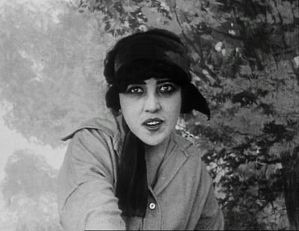Les Vampires has nothing to do with blood-sucking creatures of the night. The title refers to a group of master criminals who terrorise Paris during World War One and the story revolves around young intrepid reporter Philippe Guérande and his faithful sidekick (and brilliantly named) Oscar-Cloud Mazamette fighting against their evil ways. All but the first couple of episodes run to about 45 minutes and they stand perfectly well on their own so you can watch them occasionally while eating your lunch. Here's a link to the first episode, one of the better and shorter ones so well worth a look to see if you'll like the rest.
There are a lot of things to enjoy. Some you might find in a Boy's Own adventure story or a Tintin comic: secret passages, treasure maps, disguises, daring escapes, car chases, cunning traps, hypnosis. Some are rather more macabre: murders, suicides, severed heads in boxes, poisoned rings that kill their wearers, gas chambers. The plots are imaginative and often quite labyrinthine — you have to keep focussed if you want to follow it all! The cast list is enormous, too, and the many disguises and impersonations don't always make it easy to tell who's doing what, but that's quite fun.
One thing I really love about these silent films, which applies equally to the Buster Keaton films I wrote about earlier, is how unconstrained by studio sets they are. Directors were perfectly happy to film outside or in a real house. In later years, this became too expensive to do well and the directors retreated to sound stages where everything could be measured and controlled. Les Vampires has a terrific freedom about it and hundreds of different locations. You get to see all sorts of aspects of 1915 Paris. To be sure, it was a desolate and miserable place — there was a war on and the Western Front wasn't too far away — but that only adds to the character and sense of time the film has.
The central characters themselves are interesting and you develop a fondness for them as the series progresses. Guérande the hero is a bit bland, but his colleague Mazamette is memorable — brave and loyal, but a bit of a clown and with a rough edge. The best thing about it, though, has to be Musidora, the actress who plays Irma Vep — probably the first screen femme fatale and one of the most beautiful. Strong and deadly with incredible intense eyes, she was also an acrobat so takes part in some of the film's best stunts. She steals the show and is much more interesting than the succession of evil bosses she works for.

The picture quality isn't always brilliant, but considering the film's age this isn't too big a deal. The music is really good and fits the on-screen action perfectly. The translation from the original French is done very well, too, and not just with the intertitles. If a character is reading a newspaper article or showing us his business card they will superimpose the English translation over the top so it was clearly produced with some loving care and attention.
Wouldn't it be great to live in a world where the BBC could show this weekly at 9pm on a Sunday evening and people would watch it? Unfortunately, today's audience could never get over the whole "they ain't saying anything" problem. A shame, because I think it stands up very well as a piece of entertainment and is easily a match for a lot of today's television fare.
